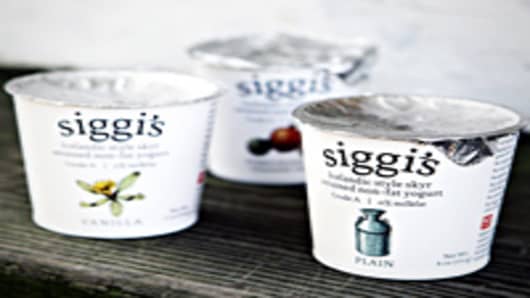For Siggi Hilmarsson, landing on Whole Foods Market’sshelves was an “inflection point” for his fledgling business.
“Before we were selling to 10, 15 stores, and we went to almost 200 overnight,” said Hilmarsson of his company, The Icelandic Milk and Skyr Corporation, which produces Siggi’s skyr, a traditional Icelandic yogurt.
The company, which Hilmarsson first began as a hobby in his kitchen while he was working as a consultant at Deloitte, quickly ballooned and is now sold in stores nationwide.
Before nailing that game-changing Whole Foods account, Hilmarsson started small by marketing his goods at a local farmers' market and personally reaching out to companies with samples.
“For Dean & DeLuca, I just walked in one day and brought the guy who was stocking the shelves some samples of yogurt and said, ‘Who do I give this to?’ And he said he’d give it to his boss,” Hilmarsson said.
For small products like Siggi’s, scoring a place on grocery and specialty stores’ shelves is a chance to reach a broader audience and an opportunity to catapult themselves to the retail big leagues.
But what exactly catches these retailers’ eyes? The first thing to know: There's no secret formula. What works for one grocery chain may not work for another.
Get to Know the Company: Whole Foods
Consumers can pick up a loaf of bread at any grocery store, but there are subtle important differences among their offerings.
At Dean & DeLuca, bread may mean a loaf of Babka, a Polish coffee cake, while at Whole Foods, it may be a whole-grain, spouted variety. During a stop at Fresh Market, sundried tomato focaccia bread could win a spot in a customer’s cart.
Before pitching to these companies, analyze what sets them apart.
“We look at what our customers prefer,” said Errol Schweizer, executive global grocery coordinator at Whole Foods Market. “If someone comes to us with chocolate, we tell them, ‘Look for fair-trade organic chocolate.’ If they are making a product with grains, we ask them to look into organic, sprouted whole grains.”
Whole Foods tends to emphasize organic, non-genetically modified, nutritious and fair-trade foods, he said. It also focuses on sustainable, renewable resources and community involvement.
The company emphasizes taking chances on new vendors by operating the Local Producer Loan program, which provides low-interest loans to small, local producers, to held them expand production for the Whole Foods shelves. The company also provides tools for vendors to market their products and develop existing items into exclusives that will work with Whole Foods’ target customer.
“We’re able to tell vendors that this is what our customers are look for,” he said. “So we’re able to say, ‘If you want to sell to us, don’t sell us some me-too products. We want innovation.’”
Schweizer advised small businesses to avoid growing too fast and said he often steers clear of companies who just want to launch nationally and ramp up production quickly, since it is often a sign that they want to flip the company.
If a supplier is interested in selling to Whole Foods, it should reach out first to the nearest regional office and then set up a meeting with one of the company’s product buyers, Schweizer said.
Tell Your Story: Fresh Market
Much of what sets small suppliers apart from the big guys is their unique histories. If a company tells its story in an interesting and compelling way, it has a better chance of catching bigger companies’ attention.
“One of the first things I do when I find a brand is I go online to learn more about them,” said Christopher van’t Wout, local market coordinator at Fresh Market .
In addition to a website that provides readers with a sense of the company’s history and mission, appealing packaging is key for emerging brands, van’t Wout said.
If a company’s packaging is not up to snuff, the grocer will provide it with tips to help it meet the government's nutritional guidelines and make it more attractive. He said he tries to steer vendors away from using artificial ingredients and preservatives where possible.
“Your packaging is your shop window,” he said. “It’s how you’re selling yourself to the outside world.”
When businesses try to reach out to Fresh Market, van’t Wout said he expects that vendors show a certain level of persistence and are willing to support their brand through in-store activities or farmer’s markets. With a business plan in place, businesses should present to their local manager or send a note to buylocal@thefreshmarket.com.
Emphasize What Is Unique: Dean & DeLuca
If a business' product has already inundated the nation’s grocery aisles, Dean & DeLuca probably won’t come clamoring to carry it.
“As soon as a product becomes mass market, it becomes not right for Dean & DeLuca," said Kathryn Flouton, the company’s head of merchandising.
Instead, the retailer stays on the hunt for the next food trend with a focus on specialty, artisanal products.
“When you want something special, when you want a gift, when you want something that you can’t get anywhere else — we want to focus on those,” she said.
Unlike the other grocers, Dean & DeLuca does not care as much if a brand has a strong social media presence.
While the company encourages businesses to get in touch by email via newproductsubmission@deandeluca.com, it prefers that vendors not send unsolicited samples.
As for Hilmarsson, it seems that landing that first big account was the key to attracting additional big deals.
“Once you basically have national distribution, people reach out to you, and give you attention,” Hilmarsson said.
Email us at SmallBiz@cnbc.com




